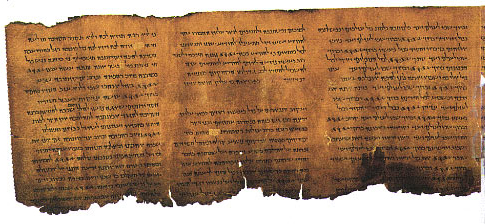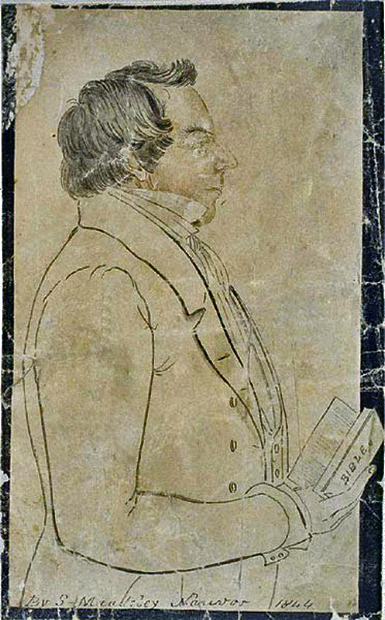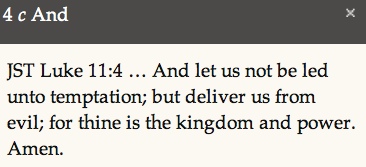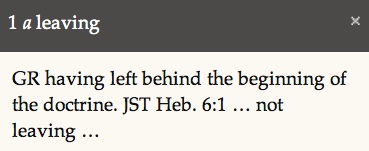Are there mistakes in the Bible?
When a sacred text is translated into another language or rewritten into a more familiar language, there are substantial risks that this process may introduce errors that may or may not be intentional thus creating doctrinal errors.
Joseph Smith stated that; "We believe the Bible to be the word of God as far as it is translated correctly; we also believe the Book of Mormon to be the word of God." (Articles of Faith 1:8)
An interesting scripture indicates that there may be and may have been, intentionally or unintentionally, mistakes made in recording scripture that may need correcting.
Note:
"All scripture is given by inspiration of God, and is profitable for doctrine, for reproof, for correction, for instruction in righteousness:" (2 Timothy 3:16-17)
---------------------
Nearly 100,000 changes have been made to the 1611 King James Bible.
Up through about 1769, an estimated 100,000 textual changes have been made to the first edition of the King James Bible.
Most of these are minor, and the vast majority were made to standardize spelling with the rise of the dictionary and add or slightly alter punctuation. Without these, a modern reader would struggle even more with the text when running across spellings like “sonne” for “son,” “yron” for “iron,” “citie” for “city,” and hundreds of others.
Over time, some other small changes were made, but whether or not these changes alter meaning significantly is up for debate. Notably, these alterations are not listed in italics like other textual additions the original translators added for clarity in English.
Some examples include:
Acts 16:1 — “which was a Jew” changed to “which was a Jewess”
1 Peter 2:5 — “sacrifice” changed to “sacrifices”
Isaiah 47:6 — “the” changed to “thy”
Isaiah 49:13 — “God” changed to “Lord”
Ezekiel 3:11 — “the people” changed to “the children of thy people”
---------------------
Compare Acts 22:9 to Acts 9:7
"And they that were with me saw indeed the light, and were afraid; but they heard not the voice of him that spake to me." (Acts 22:9)
"And the men which journeyed with him stood speechless, hearing a voice, but seeing no man."(Acts 9: 7)
Did they hear a voice or did they "not" hear a voice?
The Prophet Joseph Smith was commanded to correct by revelation to him, a few of the mistakes that were in the King James Version of the Bible. This verse was corrected as follows:
“And ------- they who were journeying with him saw indeed the light, and were afraid: but they heard not the voice of who spake to him.” (Acts 9:7, Joseph Smith Translation)
-------
Compare Matthew 13:35 to Psalms 78:2-3
”…I will open my mouth in parables; I will utter things which have been kept secret from the foundation of the world." (Matthew 13:35)
"I will open my mouth in a parable: I will utter dark sayings of old:
Which we have heard and known, and our fathers have told us." (Psalms 78:2-3)
Was the meaning of this scripture, "kept secret" or "heard and known". Which is the correct translation?
---------------------
 << The Dead Sea Scrolls of Psalms
<< The Dead Sea Scrolls of Psalms
Since the discovery of the Dead Sea Scrolls in 1950 A.D., extensive study of the Dead Sea Scrolls has resulted in changes to wording in all new translations and publications of the Old Testament. This is an example of how translators and copyists of earlier manuscripts have made errors of great significance.
The Dead Sea Scrolls in Psalms 22:16 refers to Jesus Christ’s crucifixion. "The Masoretic Text of the Hebrew Bible reads, “like a lion, my hand and my feet”.
The correct reading given in the Dead Sea Scrolls is “they pierced my hands and my feet”. (Psalms 22:16)
Deuteronomy 8:6, reads, “And you shall keep the commandments of the Lord your God, by walking in his ways and by fearing him.” This verse indicates that one must keep God’s commandments “by walking in his ways” and by “fearing him.” The Dead Sea Scrolls Bible, however, has an important variant reading: “And you shall keep the commandments of the Lord your God, by walking in his ways and by loving him. ” (4QDeuta 8:6).
These variants refer to two powerful but different emotions—fear and love. The variants also set forth a difference in how one understands Old Testament doctrines; in particular, the variants introduce the question of whether one should keep the commandments through fear or through love. The reading of love also provides us with an important view of the God of the Old Testament, who is sometimes portrayed as a strict Deity when compared with Jesus Christ and his teachings of love in the New Testament." (Donald W. Parrty, The Dead Sea Scrolls, Studies in the Bible and Antiquity)
---------------------
 << Joseph Smith, holding a Bible, 1844 Sketch
<< Joseph Smith, holding a Bible, 1844 Sketch
The Prophet Joseph Smith explained: "I believe the Bible as it read when it came from the pen of the original writers. Ignorant translators, careless transcribers, or designing and corrupt priests have committed many errors". (TPJS, p. 327)
"From sundry revelations which had been received, it was apparent that many points touching the salvation of men, had been taken from the Bible, or lost before it was compiled". (TPJS, pp. 9-10)
The Prophet Joseph Smith was commanded to correct by revelation to him, a few of the mistakes that were in the King James Version of the Bible. A few of the corrections that I find interestingly in need of correction are as follows:
"And forgive us our sins; for we also forgive every one that is indebted to us. And lead us not into temptation; but deliver us from evil." (Luke 11:4)
 << The Prophet Joseph Smith was told to correct part of this verse as follows:
<< The Prophet Joseph Smith was told to correct part of this verse as follows:
"… And let us not be led unto temptation….” (Luke 11:4, Joseph Smith Translation)
Why would God "lead us" into temptation”?
God would surely not be the one leading us into temptation. That is what Satan does.
---------------------
Note: in Hebrews 6:1 "Therefore leaving the principles of the doctrine of Christ, let us go on unto perfection...." (Hebrews 6:1)
Would Paul ask us to leave "the principles of the doctrine of Christ..."?
 <<The Lord God revealed to the Prophet Joseph Smith that one word was left out. That word was the word "not".
<<The Lord God revealed to the Prophet Joseph Smith that one word was left out. That word was the word "not".
That scripture should read: "Therefore not leaving the principles of the doctrine of Christ, let us go on unto perfection...."
--------------------
Two more good examples of mistakes found in the Bible that Lord God revealed to the Prophet Joseph Smith to be corrected are as follows;
"Behold, I send you forth as sheep in the midst of wolves: be ye therefore wise as as (serpents - corrected to),- [servants,] and harmless as doves." (Matthew 10:16)
"And ye shall be hated of all (men - corrected to)- [the world] for my name’s sake: but he that endureth to the end shall be saved." (Matthew 10:22)
--------------------
The Book of Mormon was translated in a different way. It was translated “by the gift and power of God,”.
God himself declared that “it is true.” (Book of Mormon title page, & D&C 17:6)
The Prophet Joseph Smith said that the Book of Mormon was “the most correct of any book on earth.” (History of the Church, 4:461)
If the Book of Mormon was translated “by the gift and power of God,” could it not be indeed a scriptural history that was translated correctly?
No one has ever claimed that printing and other minor mistakes were never made in printing and publishing the Book of Mormon. We are free to find faults in any scripture if we want to. But if we focus on the mistakes we will miss the great treasure therein.
--------------------
Another past scripture translator, of the various books and letters that were compiled into the Bible, decided to add a few words, 'without a cause', of his own into the teachings of Jesus Christ. The translator or scribe's addition is found in Matthew 5:22.
“But I say unto you, that whosoever is angry with his brother without a cause shall be in danger of the judgment: and whosoever shall say to his brother, Raca, shall be in danger of the council: but whosoever shall say, Thou fool, shall be in danger of hell fire.” (Matthew 5:22)
Note:
In the Joseph Smith Translation of Matthew 5:22 the Prophet Joseph Smith received revelation to remove the incorrect words that were added in by someone. The add-in words were; "without a cause".
“But I say unto you whosoever is angry with his brother shall be in danger of his judgment.” (Matthew 5:22 Joseph Smith Translation)
Also Note:
The Saviors taught the same gospel principle in western hemisphere to the Nephites.
“But I say unto you, that whosoever is angry with his brother shall be in danger of his judgment. And whosoever shall say to his brother, Raca, shall be in danger of the council; and whosoever shall say, Thou fool, shall be in danger of hell fire.” (3 Nephi 12:22) 34A.D.
--------------------
In John 5:31 another mistake in the King James verson of the bible was made. The Prophet Joseph Smith Translation changes this passage to read: "Therefore if I bear witness of myself, yet my witness is true."
...
...